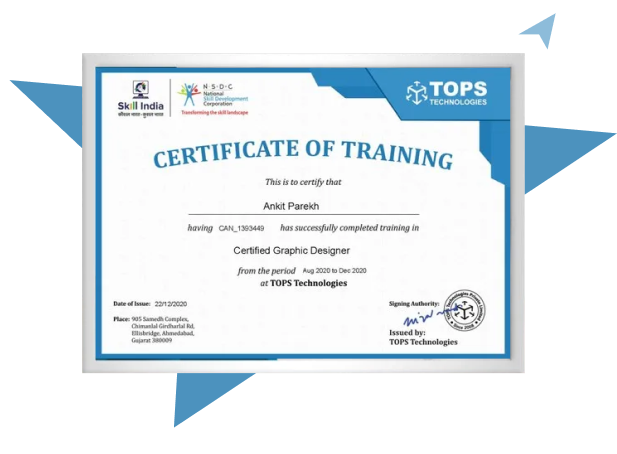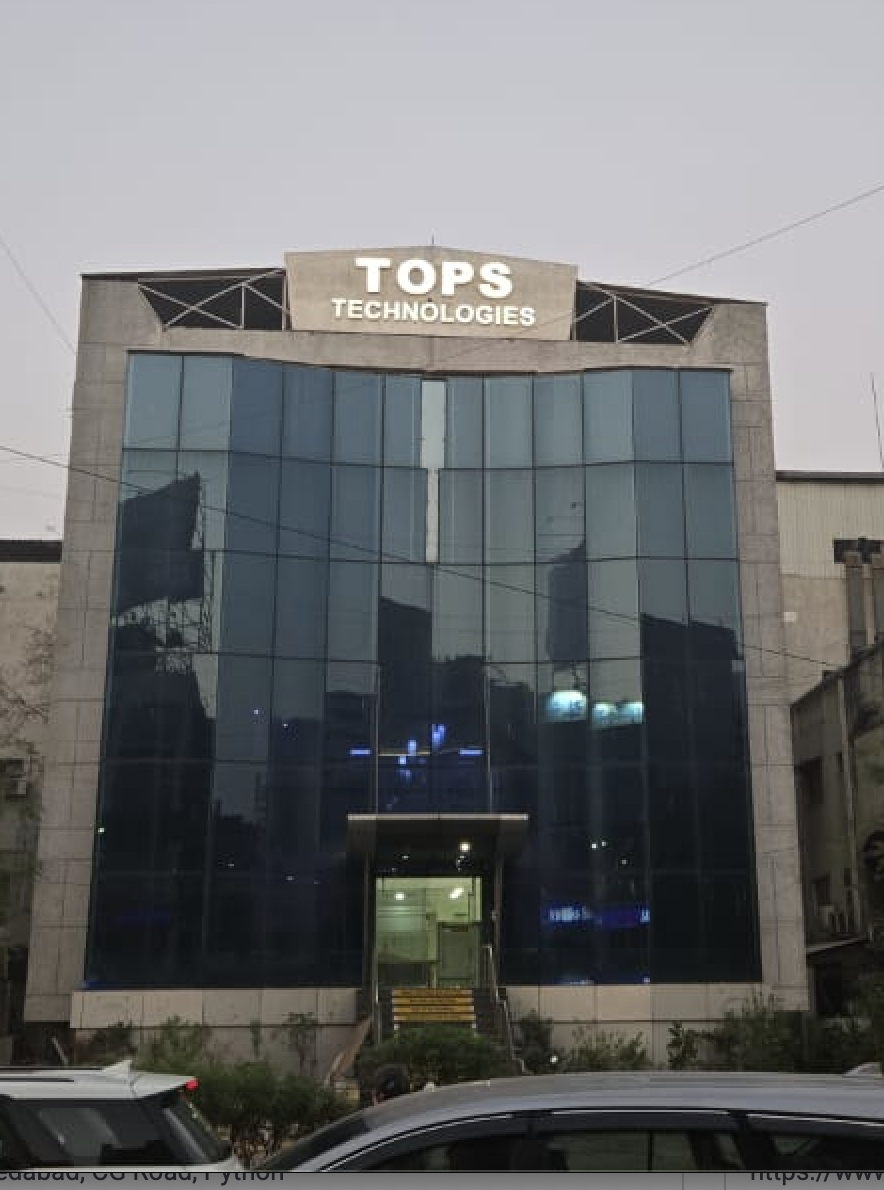Our Facts and Figures
1 Lac+
Student Placed
3000+
Companies TieUp
19+
Offices in India
50+
Industry Courses
Get 100% Job Assistance by enrolling in Certified Data Science Training Course
Key Highlights
Limited Students Batch
Personalised Attention
Highly Qualified Teachers
Flexible Batch Timings
Interactive Learning
Live Projects
Career Support
Job Oriented Training
Data Science Course Highlights
Get Certified with Our Data Science Course in Rajkot!
According to recent reports, the demand for data scientists will grow by 28% by 2024. This means that nearly 2.7 million Data Science jobs will be available by then. However, there will only be 1.5 million people with the skills necessary to fill these positions.
The demand for Data Science professionals is only going to continue to grow in the coming years. As more businesses become data-driven, they will need experts who can help them make sense of all their data. Enroll in a Data Science Course at TOPS Technologies to start your career in this field.
What is Data Science?
Data Science is an interdisciplinary field that uses scientific methods, procedures, algorithms, and systems to get knowledge and insights from data in all its different forms, such as structured and unstructured data. It is a continuation of the data mining field that emerged in the early 1990s when statisticians and computer scientists began working together to develop better ways to mine and interpret data.
Data scientists are often responsible for developing new ways to collect and analyze data and building models and algorithms to make predictions or recommendations based on that data. They may also be involved in developing visualizations or tools to help others understand complex data sets.
One of the biggest benefits is that you will gain valuable skills that can be used in various industries. It is one of the most in-demand fields, and by taking Data Science Training in Rajkot, you can show potential employers that you have the skills they are looking for.
Another benefit of taking a Data Science Course in Rajkot at TOPS Technologies is networking with other students and professionals. You will be able to meet people who are working in the field and learn from their experiences. This can be invaluable when you start your career.
Finally, Data Science Training at TOPS Technologies can help you stand out from the competition when applying for jobs. With so many people vying for Data Science positions, having a well-rounded skill set can make all the difference. By enrolling in a Data Science Master Class, you can show employers that you are committed to your career and are willing to invest in your development.
Benefits Of Data Science
Better Products
Customers will buy from a company if they are interested in its offer. They must produce items that meet the needs of their clients and guarantee their contentment. Businesses want data so that they can make the best product possible.
The technique entails analysing client feedback to determine which goods are most suitable. The advanced analytical techniques of Data Science are used to do this investigation. In addition, companies use current market trends to create products for the public. These market trends give organisations information about the product's current demand. Innovation facilitates the evolution of businesses.
With the expansion of data, enterprises may adopt not just newer items but also a variety of inventive techniques.
More Efficient Management
Data Science allows firms to operate more effectively. Both huge corporations and small enterprises may benefit from Data Science to expand. Data scientists are very important for figuring out how healthy an organisation is. With the help of this, businesses can figure out how likely it is that their plan will work. Data Scientists are responsible for turning raw data into cooked data.
This aids in summarising the company's success and the product's health. It identifies critical parameters that are vital for determining the effectiveness of an organisation. Based on this information, the firm may quantify and analyse its performance and take the necessary management actions. It may also assist managers in analysing and identifying potential applicants for the organisation.
Using Data Science to keep track of a company's performance, success rate, and other important factors can also be a good way for businesses to help develop their leaders. Using labour analytics, businesses can find out what their workers find most helpful.
Enhance Predictive Analysis
The most vital component of organisations is predictive analytics. With the development of powerful predictive tools and technology, businesses have increased their capacity to manage various data types.
Predictive analytics is the statistical study of data utilising several machine learning algorithms to predict future outcomes based on past data. There are several tools for predictive analytics, including SAS, IBM SPSS, SAP HANA, etc.
There are several commercial uses for predictive analytics, including customer segmentation, risk analysis, sales forecasting, and market analysis. With predictive analytics, firms have a competitive advantage because they can anticipate future occurrences and take necessary action.
Improve Decision-Making
Businesses require these projections to understand future consequences. Based on this, firms make data-driven decisions. In the past, many firms made terrible judgments because they lacked surveys or relied solely on their "gut feelings." It would lead to some bad judgments and millions in losses.
With the availability of a wealth of data and the appropriate data tools, it is now feasible for the data industries to make data-driven choices. In addition, business choices may be made with the aid of potent tools that analyse data quickly and deliver reliable findings.
Better Business Decisions
After making judgments based on forecasts of future events, businesses must evaluate them. This is attainable through the use of a variety of instruments for testing hypotheses.
After executing the decisions, firms should comprehend how these decisions affect their growth and performance. If the choice turns out to be bad, they will need to look into it to find a way to fix the problem that is stopping them from being successful.
There are several methods through which firms may review their decisions and design an appropriate action approach. These judgments are based on client requirements, corporate objectives, and the needs of the project managers. Moreover, by using Data Science, firms may significantly increase their earnings by predicting future growth based on their current actions.
Industries That Use Data Science
Data Science has become integral to many industries, from healthcare to finance. Here are some of the most common industries that use Data Science:
Healthcare: Data science is being used to make positive changes in healthcare. For example, it is being used to study how cancer starts and spreads, find new treatments, and improve patient care. Researchers use data to learn more about diseases, make better treatments, and improve care for patients.
Banking and Finance: It is very important in banking and finance. Banks use data to learn more about their customers, find fraud, and deal with risk. Financial institutions also use data to come up with new products and services, such as personalised financial advice and recommendations.
Telecommunications: The use of data science is helping companies in this industry learn more about their customers and what they need. By analysing call patterns, social media data, and other sources of information, telecom companies can improve customer service, target marketing campaigns, and reduce churn.
Retail: Data science is helping retailers improve their business by helping them understand how customers behave and predict the demand for certain products. By analysing customer data, retailers can make each customer's shopping experience more personal, improve the way they keep track of their inventory, and find opportunities for making new products.
TOPS Technologies is the Best Data Science Institute in Rajkot that offers a Data Science Course that will help you get started with your career in this field.
Data Science Job Roles and Salary
Within the field of Data Science, a wide variety of work may be done, each of which has its own particular set of duties. Here are some of the most prevalent employment roles include the following:
Data Scientist: Data Scientists are responsible for gaining insights from large amounts of data via the application of statistical and machine learning methods. They also need to be able to explain their results to audiences who are not technically oriented. A Data Scientist in Rajkot can make an average annual salary of up to 11 Lakhs Indian Rupees (INR).
Data Engineer: A data engineer's primary responsibilities include constructing and maintaining the infrastructure used to gather, store, and process data. They need to be knowledgeable in programming languages such as Java and Python and have the ability to work with big volumes of data. On average, a Data Engineer in Rajkot can make up to 12 Lakhs Indian Rupees (INR) per year.
Business Analyst: These professionals help companies and other organisations improve their business choices by analysing data. They need to comprehend the company's necessities and articulate them so that the data scientists and the engineers can understand. In Rajkot, a Business Analyst can make up to 8 Lakhs Indian Rupees per year (INR).
Product Manager: Product Managers oversee the coordination of the gathering and analysis of relevant data for the products they oversee. They have to recognise what the consumer wants and articulate those desires in a way the technical team can understand. A Product Manager in Rajkot can make an average salary of up to 10 Lakhs Indian Rupees (INR).
If you're interested in Data Science, consider enrolling in TOPS Technologies, which offers IT Training in Rajkot to help you get a high-paying job in Rajkot.
Data Science Training Course with Job Placement
TOPS Technologies Data Science Course is the #1 course in Rajkot. Thousands of students are enrolling in this Course and becoming highly skilled Data Scientists, ready to take on the professional world. These Data Scientists are proficient in using modern tools and techniques to manage unstructured data and derive data patterns and actionable business insights from this data to positively impact the ROI. We also offer Final Year Project Training in Rajkot.
What Is a Data Science Course All About?
The Data Science Certification Course in Rajkot is designed by experts who have academic and industry experience. The Course enables students to leverage the power of data to drive insightful business decisions to positively impact the bottom line. In this course, we cover topics like Hypothesis testing, Basics of R Programming, Variance and Regression Analysis, and carry out Cluster Analysis and Correlation. The student learns the art of data management and analysis to build a successful career as a Data Scientist, not only in Rajkot but across small companies to large MNCs across the globe.
Do you want to become a certified Data Scientist? TOPS Technologies Can Help You! Training Includes
- Data Science Live project
- Data Science Certification
- Data Science Development
- Data Science Programs
Why choose TOPS Technologies for your Data Science Training?
TOPS Technologies teaches you the art of working with vast data. It is a leading Data Science Certification Course and training institute with one of Rajkot's best Data Science courses. Here you will learn to collect, maintain, manipulate and visualise large data and drive a positive impact on business. In addition to learning based on theory, practical practice, quizzes, and assignments, TOPS Technologies also hand-holds students by providing placement support and expert guidance to crack Data Scientist job interviews and get hired as a Data Scientist.
Why is this the Best Data Science Course in Rajkot?
Learn from teachers who have years of experience in both academics and industry.
Enjoy self-paced learning, as you gradually progress from basic topics like introduction to Data Science, data collection, measurement, visualisation, etc., to more advanced topics like predictive analysis, regression analysis, correlation, and applying machine learning algorithms.
The teaching is formulated with the correct mix of theory, practical, live projects, and assignments to aid quick and immersive learning. This teaching methodology hones students to handle challenges independently in the real world and secure the best jobs and career growth.
If you want to learn Data Science skills and get that professional leverage as a Data Scientist, then you have come to the right place. We also offer an industry-recognised certification. Learn from our experienced instructors and get the best Data Science Training in Rajkot.
Who can enroll in our Data Science Course in Rajkot at TOPS Technologies?
Anyone can enroll in our Data Science Course in Rajkot at TOPS Technologies. We offer a wide range of Data Science Classes in Rajkot that caters to different levels of expertise, from beginners to advanced. Whether you want to learn the basics of Data Science or become an expert, we have a course for you.
Our Data Science Classes in Rajkot are designed to give you the skills and knowledge you need to succeed in today's competitive job market. With our experienced faculty, we provide an environment that is conducive to learning and growth. So what are you waiting for? Enroll now and take your first step toward a successful career in Data Science!
Customized Data Science Training In Rajkot
Rajkot is one of Gujarat's most important and largest cities. The city is known for its textile industry and has been making things for a long time. There are also several IT companies in the city, which will likely make a big difference in its economy. The government of India has named Rajkot an "IT Hub," and this has caused the IT industry in the city to grow quickly.
Just in the Rajkot district, the IT industry employs about 10,000 people and brings in about Rs.500 million each year for the local economy.
Build your career as a data scientist, learn how to manage unstructured data efficiently, identify patterns, create visual representation data and analyse data to draw insightful information. Our experts will guide you through live projects and prepare you for excellence as a professional.
If you have questions about the Data Science Training Course in Rajkot, contact us at inquiry@tops-int.com or call us at +91 – 7622011173 for a free demo.
40%
Average Salary Hike
4.5 Lacs
Highest Salary
3000+
Hiring Partners
Join Our Free Upcoming Webinar
Learn the Website Hacks and Provide Better Security
23 Dec 2025, 04:00 PM
Trainer
Faruk Pathan
(Sr. Technical Trainer)
Data Science with AI: Tools, Trends and Real-World Use Cases
24 Dec 2025, 03:00 PM
Trainer
Priya Shah
(Sr. Technical Trainer)
Learn Python in 60 Minutes
25 Dec 2025, 04:00 PM
Trainer
Sanket Chauhan
(Sr. Technical Trainer)
AI in Graphic Design – Future of Creativity
26 Dec 2025, 02:30 PM
Trainer
Parth Patel
(Sr. Technical Trainer)
Data Science Course Curriculum
Download Curriculum- Introduction to Data Science
- Introduction to Python Programming
- Programming in Python
- Python for Data Science
- Data Visualization in Python
- Introduction to Statistics for DS
- Descriptive Statistics
- Inferential Statistics
- Hypothesis Testing
- Types of Hypothesis Testing
- Fundamentals of Regression Analysis
- Excel With Formulas
- Conditional Statements
- Formula Based Conditional Formatting
- Data Visualization
- Excel Chart Formatting
- Formatting Data with Pivot Tables
- Introduction to SQL
- SQL Constraints and Alias
- SQL Selection Commands
- SQL Functions
- SQL Joins
- SQL Views
- SQL Indexes
- Python Packages
- Numpy, Pandas, Scipy, Matplolib, Seaborn
- Types of Data Analytics
- Introduction to Machine Learning
- Types of Algorithms
- Supervised, Unsupervised, Reinforcement Learning
- Regression, Linear Regression
- Clustering
- Classification
- Decision Tree, Random Forest, Boosting
- Model Selection, Random Search,
- Time Series, Handling Time Series in Pandas
- Introduction to Deep Learning
- Introduction to ANN
- Building Artificial Neural Network
- Build Model Based on CNN
- Introduction to RNN
- Introduction to NLP
- Application of NLP
Our TOPS Training Centers in India
Get Training Certificate by Government
Recognized NSDC/Skill India

- National Skill Development Corporation
- Supported by the vision of PM Shri Narendra Modi
- Certification by NSDC SkillIndia
- Valid for all Jobs and College Training
- International Recognition

FAQ
Recent years have seen considerable growth in the discipline of data science. This multidisciplinary area combines computer science, statistics, mathematics, and domain-specific expertise to extract data insights. Decision-making in virtually every industry now relies heavily on data science, studying the best ways to utilise data to find remedies to logistical considerations. As a result, there is a rising need for knowledgeable people who can glean insights from data and provide insightful business information due to the exponential expansion of data. Studying data science may bring various advantages, including a rewarding profession, excellent employment prospects, and a competitive compensation package.
Data science is a discipline not confined to any industry or sector. This profession's talents can be used in various situations, including the medical field, the financial business, the retail industry, and many others. Data science is also a dynamic and fascinating career choice since it constantly changes. Mastering data science may improve your work prospects and gain a competitive advantage. Our data science course at TOPS Technologies is meant to provide you with a thorough grasp of data science and its applications. You will develop the ability to extract data insights and support corporate decision-making. With the help of our skilled teachers and cutting-edge infrastructure, we give you the most outstanding educational experiences possible, guaranteeing you possess everything you require to flourish in the data science business.
A wide variety of subjects are covered in our comprehensive data science course. You need a solid foundation in the foundations to excel in data science, which is why our course begins with an orientation to data analysis, where you will discover how to use Python to cleanse, convert, and manipulate data. The next step is machine learning, wherein you'll learn how to create models to forecast the future and categorise data. Also, you will know how to test hypotheses, use linear regression, and more throughout our course's statistical modeling. We also provide training in visualisation techniques, where you will learn how to make explicit, understandable visual data representations.
Several data science libraries, like NumPy, Pandas, and Scikit-learn, which are critical instruments for every data scientist, are also covered in our course. At TOPS Technologies, we aim to offer you the knowledge and abilities you need to be successful in the data science industry. With this rationale, we have created a thorough course that covers all the essential subjects required for a professional life in data science. Our knowledgeable instructors will lead you through the course and ensure you fully grasp the fundamentals. With the assistance of our data science course, you will be better ready to confront the difficulties of the data-driven economy and acquire a competitive advantage in the job market.
TOPS Technologies believes strongly in the democratisation of data science education. Everyone should have the chance to learn this excellent topic regardless of their history or aptitude. To accommodate total novices, we made no assumptions about their past programming or data science skills while building our data science course. We designed our course with the awareness that only some are proficient in arithmetic or statistics. We want to teach you the fundamental skills required for success in data science. While a strong background in statistics and maths is beneficial, you can follow along with our curriculum even if you do not.
However, we go beyond the fundamentals. We go out of our way to ensure you have a solid basis in statistics and mathematics. We believe that success in data science requires a solid foundation in statistics and mathematics. You will have a good grip on data science principles by the conclusion of our course and be well on your way to becoming an expert in it. But that is not all. Our training requires an internet-connected laptop or desktop. Our training materials are accessible 24/7 worldwide. We want you to study whenever and wherever you choose for the best learning experience.
Our data science curriculum lasts three to six months and encompasses several training hours. The timeframe varies depending on the program add-ons and your options. We provide in-person and online training choices. Our instructors will guide you through the fundamentals and assure you apprehend the fundamentals. The course aims to deliver the practical experience and the professional abilities you need to succeed in the data science sector.
Data engineering, visualisation, analysis, machine learning, and other topics will be covered. So you will be allowed to complete research and get the certification after the course. We are committed to assisting you in acquiring the skills and information necessary to succeed in your job. We provide mentoring and career advice throughout the course to further assure your success. Furthermore, our knowledgeable team is accessible to address any queries you may have.
After finishing our data science course, you will possess the understanding and abilities needed to serve as a data analyst, data scientist, machine learning engineer, management consultant, or analytics engineer. These jobs are in high demand and, if successful, can lead to significant career advancement. When you complete the program, our placement team will assist you in finding employment opportunities that match your qualifications. Data analysts collect, organize, and analyse large amounts of data to discover patterns, gain insights, and make forecasts. Predictions based on data analytics are the bread and butter of data scientists.
Machine learning engineers develop and improve algorithms and models for the field. A business analyst's expertise can help an organisation's operations, development, and efficiency. Finally, data engineers design Big Data solutions to store and manage a company's data, such as databases and data warehouses. Depending on the individual's abilities and interests, the skills and information gained in the data science course can be applied in various fields, including those listed above. Because the ability to work with data is becoming more valuable, those who pursue careers in data science have bright prospects.
Interview Questions
A random forest is made up of several decision trees. You get the random forest when you separate the data into several packages and build a decision tree for each package.
Constructing a random forest model:
- Choose 'k' features at random from a total of 'm' features where k << m
- Compute node D using the best-split point among the "k" characteristics.
- Using the best split, divide the node into daughter nodes.
- Continue steps two and three until the leaf nodes are complete.
- Create a forest by repeating the procedure one through four n times to produce n trees.
Resampling is a sampling technique used to improve reliability and quantify the uncertainty of demographic features. It is done to check that the algorithm is effective enough by putting it through training on diverse patterns in a dataset to confirm that variances are handled. It is also done when models must be verified using randomised subsets or labelling data points while doing tests.
- The following are the numerous steps involved in an analytics project:
- Understanding the business problem
- Exploring the data and understanding it
- Preparing the data for modelling employing detecting outlier values, transforming variables, treating missing values, et cetera
- Running the model and analysing the result for making appropriate changes or modifications to the model (an iterative step that repeats until the best possible outcome is reached)
- Validating the model using a new dataset
- Implementing the model and tracking the result for analysing the performance of the same
True positive rate: The proportion of genuine positives accurately detected in machine learning is determined by true-positive rates, also known as sensitivity or recall. True Positive Rate is calculated as True Positives/Positive. Rate of false positives: The likelihood of incorrectly rejecting the null hypothesis for a given test is known as the false positive rate. The ratio of the number of adverse events that were mistakenly classified as positive (false positives) to the total number of actual events is used to compute the false-positive rate. False-Positive Rate = False-Positives/Negatives is the formula.
Creating systems that provide value necessitates an utterly distinct method from traditional application development, one guided by data science. We used to study the input, establish the intended output, and then write code with appropriate rules and statements to turn the provided input into the desired outcome in traditional programming paradigms. As you can expect, developing these principles for data such as images, videos, and other sorts of data that even computers were having trouble comprehending was challenging.
This process is modified somewhat by data science. First, we need access to considerable data, including the necessary inputs and how they relate to the expected results. Then, we use algorithms from data science, which utilise mathematical analysis to create rules that convert inputs to outputs. Training is the term used to describe this rule-making process. We use the data set aside before training to test and confirm the system's accuracy after training. Since the generated rules are opaque, we cannot understand how the inputs are transformed into outputs.
But if the accuracy is sufficient, we could use the system (also called a model). As indicated above, the rules for converting the input into the output had to be written in traditional programming. Nevertheless, in data science, the rules are generated or learned automatically from the given data. This helped many firms find solutions to some complicated situations.
The homogeneity of a sample may be determined using entropy. If the entropy value is ‘0,’ then the sample is homogeneous. The sample is evenly split; however, if entropy equals 1. Entropy determines how a Decision Tree divides the data. It truly influences how a Decision Tree constructs its borders. Once the dataset is divided based on an attribute, the information gain relies on the entropy's decline. Building a decision tree constantly involves identifying the qualities that provide the best information gain.
As a data scientist, I usually create predictive models by thoroughly exploring and purifying the available data. This entails finding any outliers, missing numbers, or other data quality concerns affecting the analysis. After that, I do feature engineering, which entails choosing, altering, and scaling the relevant data characteristics for the model. Finally, I use a variety of strategies to choose the best machine learning model or models for the problem at hand, such as decision trees or linear regression.
After choosing a model or models, I test their performance using cross-validation and other methods to choose the most reliable and accurate model. I work on building and deploying the model, which involves duties like creating the user interface and testing for scalability and usability. I use various tools and methods during this process, including deep learning technologies like neural networks and Python libraries like Scikit-learn and TensorFlow. I also make sure to constantly keep the project's particular objectives and context in mind, and I work to make it easy for stakeholders to understand my strategy and findings.
Latest Blogs
Data Science Recruitment 2025: What Employers Must...
Discover key skills, trends, and strategies for data science recruitment in 2025. Learn how employer...
View full BlogThe Best IT Courses to Pursue in 2025 for Tech Pro...
As technology continues to evolve, staying ahead in the tech industry requires constant learning and...
View full Blog15 Data Scientist Skills You Must Have in 2024
In the transformative world of data science, the landscape is continuously evolving. The global bi...
View full BlogData Science Roadmap in 2025– The Ultimate Guide
Explore the dynamic world of data science in 2023 with our ultimate guide. Uncover key trends, cutti...
View full Blog









